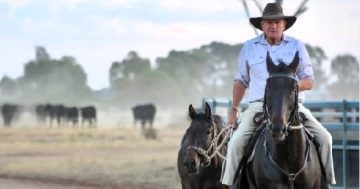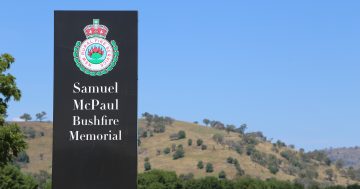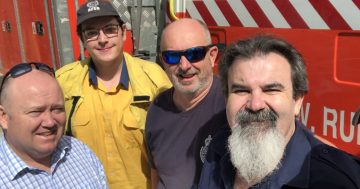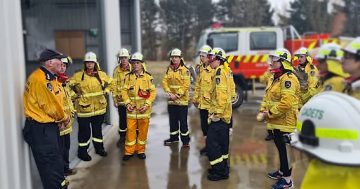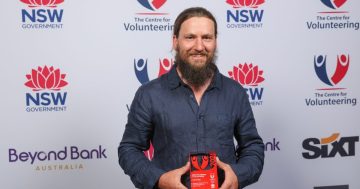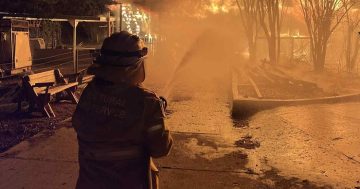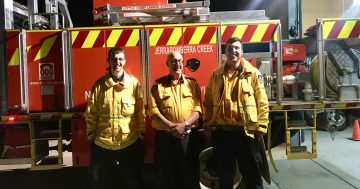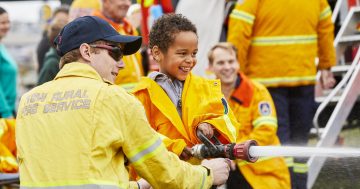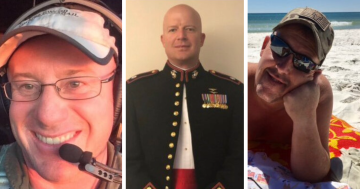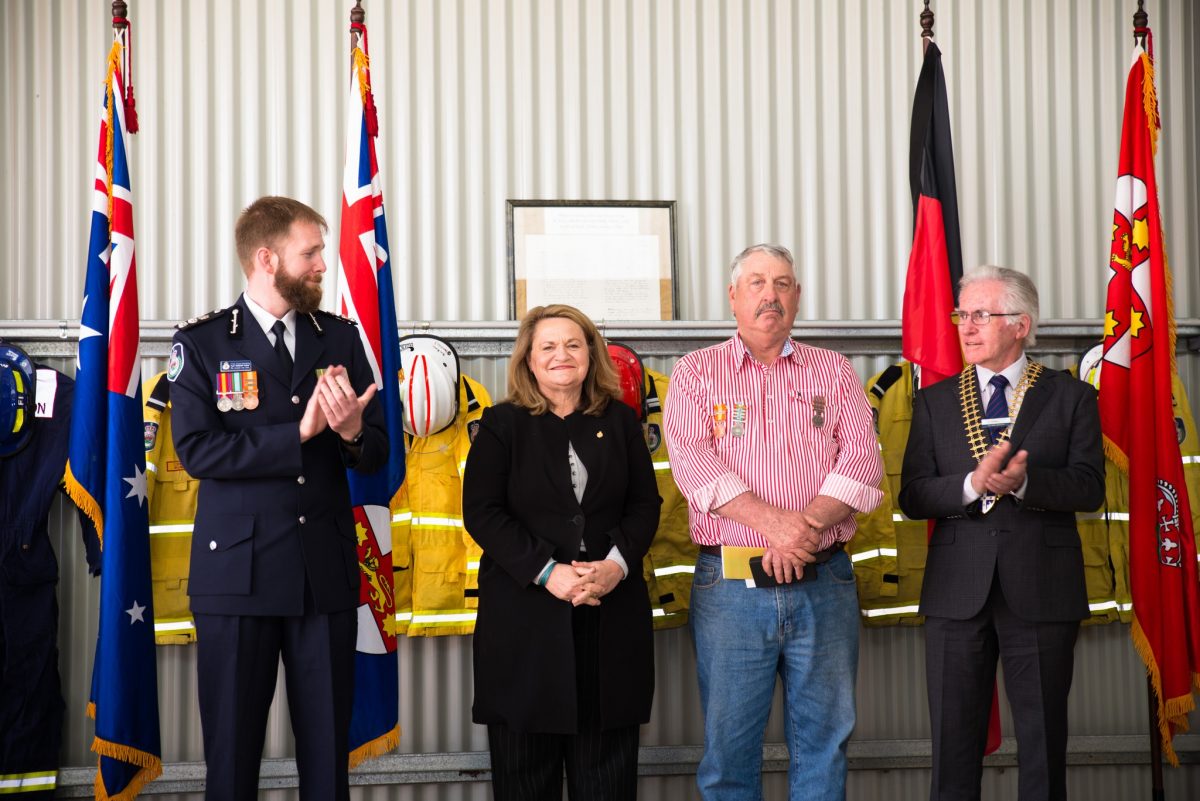
Wallaroo volunteer bushfire brigade stalwart, William “Willo” Cameron, second from right, is congratulated on his long service with the RFS. South Eastern Area Commander, Chief Superintendent Paul Simakoff-Ellims, left, Member for Goulburn Wendy Tuckerman and, far right, the Mayor of Yass, Allan McGrath, were on hand to congratulate him. Photo: Supplied.
Fighting bushfires is not something you learn from books. You have to be out there, with your mates, ideally on land you know, if you have any chance of saving life, limb and property.
Few people know what it’s really like than William “Willo” Cameron, former captain, senior deputy, and multi-office holder of the Wallaroo branch of the Rural Fire Service (RFS), who has just been honoured with an award for 53 years’ service.
For Willo, he just started doing what his father, also a captain of the brigade, did.
Although born in Sydney, you get the feeling he left there as soon as he could – turns out he was about five years old when the family settled on farmland in the ACT before moving on to an adjacent NSW property. “It’s like my father perceived what would happen with ACT leasehold land back then,” he said.
“But for me, all I’ve ever cared about is being able to see my cows in between the houses,” he joked.
Willo has been involved with the Wallaroo brigade since he was probably old enough to scramble onto the truck.
“When you live on a farm you’re always aware of bushfires,” he said. “I always thought I’d do something else, not be a farmer, but it seems I was always meant to be a farmer. I got sidetracked with a couple of things over the years, but it’s always been farming for me.”
In the early days of the Wallaroo brigade, members would just acquire firefighting vehicles and they’d be kept in people’s sheds, on their farms, wherever there was room.
“There was a push for the brigade to put them in a central location so they weren’t left about in the weather, so we looked for a site. There was no shire or government land back then. But there was this one little piece, on the border at the Barton Highway, on top of the hill. You could run a tanker in from either direction, there was pretty good vision from up there. It was the ideal spot. It was also on the corner of my property. But I didn’t really miss it.”
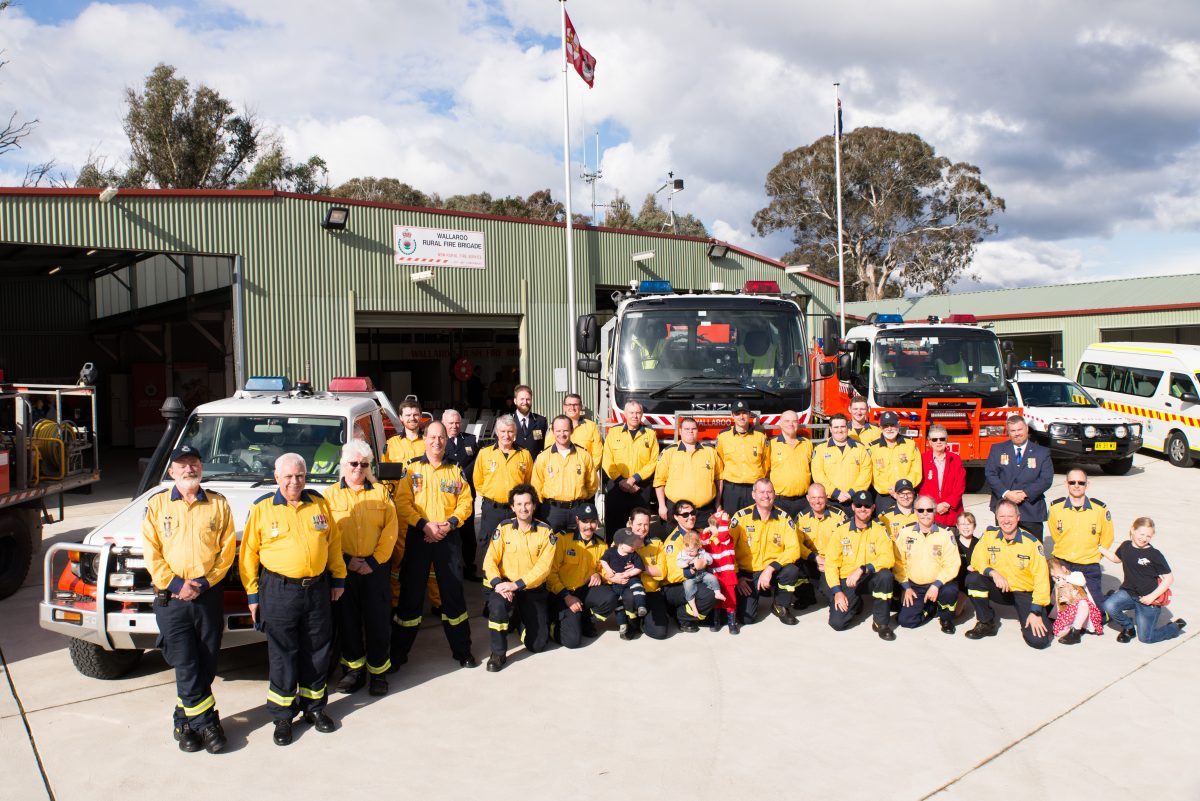
The Wallaroo Rural Fire Service photographed earlier this year to mark the brigade’s 80th anniversary. The land on which the station stands was donated by the brigade’s former captain and long-standing member, William “Willo” Cameron. Photo: RFS.
So Willo ended up giving a couple of acres of his farm to the volunteer bushfire brigade.
“It still works well today,” he said, “although it’s a bit squeezy now. “Maybe I should have made it bigger then.”
Fighting fires was different in those days, Willo recalled. When you know the land like he did, when you’d been fighting fires since you were old enough to hold a hose and had learned from the best, it would be hard to be told how to do your job or learn from books. “I knew where every rock was on this place, the fastest way to get where we had to go,” he said.
“When I retired, I have to say, I was glad not to have to get out of bed at 2 am in the middle of winter because some ratbag had stolen a car in Canberra and set fire to it and I’d have to sit out there in the freezing cold waiting for the cops to arrive.”
Although, now 70 and officially retired, Willo knows he’d find it hard to “stay sitting up here if there was a fire up the road”. “I’m getting old, but I’m not too old to do it,” he said.
Standing by him all these years, along with their three children, Willo’s wife Joy knows only too well how the job can take its toll.
When asked about times he will never forget during those 53 years, Willo said there was nothing special. Joy remembered differently.
“I can tell you the sort of things he did,” Joy said. “It was a lot more than just fighting fires. One thing I’ll never forget was before the upgrade of the Wallaroo Road, there was a low-level river crossing that used to flood. Willo would get up every morning at six when it was in flood and leave his car on one side so he could transport kids to school on the other side. He then continued to take people across who had to go to work and went back in the afternoon and evening for people coming from school and work. He continued doing that until they built a bigger bridge.
“That’s the sort of thing he did.”
But it was the tragedy that was the Canberra fires of 2003 that were to stay with them, like they did for everyone who came across their path.
“He was doing a 24-hour stint in the Brindabellas,” Joy said. “There were three fires burning. When he came home he said to me, ‘We can’t get resources out there, we can’t backburn. Those three fires are going to join together – God save Canberra’.”







